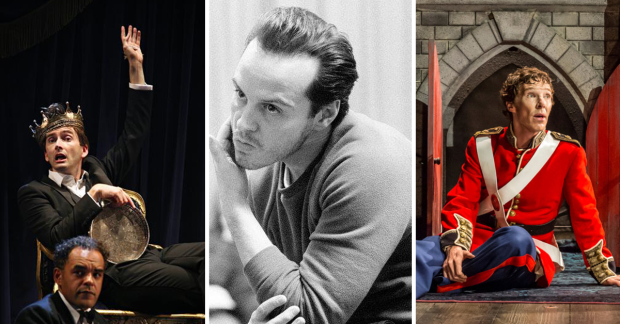From Ben Whishaw to Andrew Scott, each Hamlet becomes part of how we view the world
Ahead of Andrew Scott’s turn as Hamlet, Sarah Crompton looks back at some of the actors who have taken on the role

© Ellie Kurttz/RSC/Miles Aldridge/Johan Persson
It’s sometimes hard to believe your luck as a theatregoer. If you’re a Sherlock fan, the excitement is even greater. Not even a year after Benedict Cumberbatch, alias Sherlock Holmes, starred as Hamlet at the Barbican, his televisual nemesis Moriarty is stepping up to the plate in the same role.
But that’s not the only reason for the sense of anticipation about Andrew Scott opening in Robert Icke‘s production of Hamlet at the Almeida next week. The play itself generates a richness of interpretation that is unique in Shakespeare – and pretty unusual in theatre. As John Dover Wilson put it "There are as many Hamlets as there are actors that play him." And that makes the play as rewarding for the audience as it does for the actors. You see it being rewritten in front of your eyes every time it is performed.
My first Hamlet was Jonathan Pryce, at the Royal Court in 1980, when the director Richard Eyre decided to make the dithering hero a man literally possessed by his father’s ghost. I came down on the bus from Oxford to see a matinee and was overwhelmed by every aspect of the production – not just Pryce’s astonishing performance, the echoing voices pouring from his mouth as he clutched his body in pain, but the way Elsinore was a nest of spies, a poisonous place that destroyed those who lived within its walls.
You see Hamlet being rewritten in front of your eyes every time it is performed
I was working on the South Bank by the time Daniel Day Lewis played Hamlet at the National Theatre – and vividly remember the day he walked out, apparently unable to cope any longer with the sense of confronting his own father’s ghost. The fact that this happened in a building down the road from my magazine's office made me feel an ancient play had come to life just round the corner. I was sorry to miss his performance and even sorrier not to catch Ian Charleson, who took over in 1989, just months before his tragically early death, with memorable impact.
But I was there at The Old Vic on the night in 2004 when Ben Whishaw, a 23 year-old straight out of drama school, announced his presence on the acting scene with a snot-stained Hamlet of such agonising youth and deep despair that the entire audience emerged shaken and convinced they had seen a star in the making as well as one of the great Hamlets of our age. I felt the same way at the RSC last year when Paapa Essiedu took on the role, bringing great poetry to the verse and incredible verve to the performance.
Not only do I recall the performances but those associations bring back what I was doing at the time
Other Hamlets I have loved include Mark Rylance‘s crazed lunatic, Simon Russell Beale’s quiet and holy prince and David Tennant‘s witty neurotic. I admired Cumberbatch too, though I felt – as I did when I saw Kenneth Branagh in the RSC production of 1992 – that temperamentally the actor seemed slightly too organised to hesitate quite as much as Hamlet does.
What I notice when I turn over these memories in my mind, is that not only do I recall the performances but those associations bring back what I was doing at the time. It is as if Hamlet has been a player in my life. I am not (whatever William Hazlitt might say) Hamlet, but Hamlet is a marker of the times I have lived through – and the productions I have seen have often reflected those times back at me.
So when I see Andrew Scott, an actor whose intelligence and originality illuminate everything he does, take on the part, I know in advance that whatever his performance is like, it will embed itself in a new layer of theatrical experience and memory. It will become part of how I view the world. It’s an astonishing play that can provide such memories and such resonance. Every time I watch it, I do indeed feel lucky.












